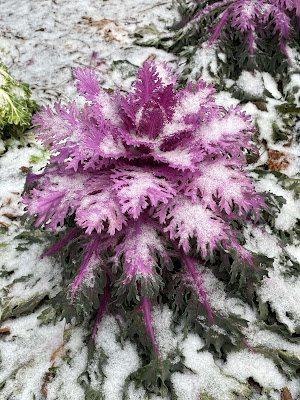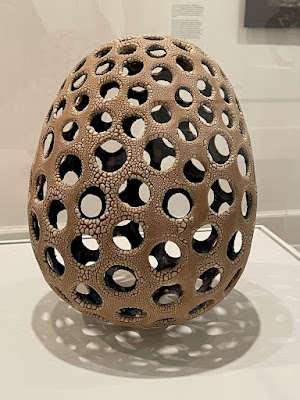Some amusing creatures emerge as yesterday's snow slowly melts...
Sunday, January 30, 2022
Saturday, January 29, 2022
Friday, January 28, 2022
Wednesday, January 26, 2022
Setting the stage
Tuesday, January 25, 2022
Titanic
 Remember when this beauty - A68a, "an iceberg the size of Delaware!" - broke off from the Larsen C ice shelf in Antarctica? (Not this one.) Well, just four years later, it is no more, having floated, spun, thinned, and finally broken up. It had quite a last dance.
Remember when this beauty - A68a, "an iceberg the size of Delaware!" - broke off from the Larsen C ice shelf in Antarctica? (Not this one.) Well, just four years later, it is no more, having floated, spun, thinned, and finally broken up. It had quite a last dance.
Monday, January 24, 2022
New semester
Sunday, January 23, 2022
bell and Thay
 Just a few days ago, thinking I might celebrate the late bell hooks in a reading in one of my classes, I happened on this 2000 account of her relationship with the great Buddhist teacher of our time Thich Nhat Hanh. And now Thay (as his students call him) has left us, too.
Just a few days ago, thinking I might celebrate the late bell hooks in a reading in one of my classes, I happened on this 2000 account of her relationship with the great Buddhist teacher of our time Thich Nhat Hanh. And now Thay (as his students call him) has left us, too.Saturday, January 22, 2022
Downy

As the planet warms, the Arctic treeline is accelerating towards the pole, turning the white landscape to green. The trees used to creep forward a few centimetres every year; now they are leaping north at a rate of 40 to 50 metres a year. (source)
Friday, January 21, 2022
Teach teach teach
Thursday, January 20, 2022
Tree alphabet

Ash, Birch, Crabapple, Dawn redwood, Elm, Flowering dogwood, Ginkgo, Hawthorn, Ilex, Juniper, Kentucky coffeetree, Linden, Maple, Nyssa, Oak, Persimmon, Quaking aspen, Redbud, Sassafras, Tulip tree, Umbrella pine, Virginia pine, Willow, Xanthoxylum Americanum, Yellowwood, Zelkova
You could potentially plant secret messages, discernible only to those with the key. In the meantime, can you decipher my message above?
Wednesday, January 19, 2022
AI religion
Tuesday, January 18, 2022
Carved
 Have you seen pictures of the amazing sculptures the wind carved in frozen sand along the shore of Lake Michigan recently? As much as 15" high, they have been likened to chess pieces. They replicate in a matter of days forms we're more used to see as the accumulated work of thousands and millions of years of erosion. I think they're awesomely time scale-jangling but a Texan friend declared: "Unfair!"
Have you seen pictures of the amazing sculptures the wind carved in frozen sand along the shore of Lake Michigan recently? As much as 15" high, they have been likened to chess pieces. They replicate in a matter of days forms we're more used to see as the accumulated work of thousands and millions of years of erosion. I think they're awesomely time scale-jangling but a Texan friend declared: "Unfair!"Monday, January 17, 2022
Unpredictable
Sunday, January 16, 2022
Arboritecture
 Who knew that trees have only a limited set of "architectures"? Francis Hallé, Roelof Oldeman and P. B. Tomlinson observed as many as 23 (later revised to 24), each a different combinations of six options: 1) To branch or not to branch? 2) If branching, only at bottom of stem or all along it? 3) Do you grow without rest or is there a dormant season? 4) Do all your branches grow upward or outward, or do some grow upward and outward? 5) Do you flower at branch tips or on smaller lateral branches? 6) Do your branches change back and forth between growing upward and outward?
Who knew that trees have only a limited set of "architectures"? Francis Hallé, Roelof Oldeman and P. B. Tomlinson observed as many as 23 (later revised to 24), each a different combinations of six options: 1) To branch or not to branch? 2) If branching, only at bottom of stem or all along it? 3) Do you grow without rest or is there a dormant season? 4) Do all your branches grow upward or outward, or do some grow upward and outward? 5) Do you flower at branch tips or on smaller lateral branches? 6) Do your branches change back and forth between growing upward and outward? Saturday, January 15, 2022
Winter scenes
Friday, January 14, 2022
Well placed
 For instance, African American, Cherokee and Shinnecock heritages inspire Richard Mayhew's gauzy landscape "Pastoral" (1962) provides an obscurely dreamy horizon in the dimly lit room of precolumbian sculptures. This early 18th century traveling desk, from Bolivia or
For instance, African American, Cherokee and Shinnecock heritages inspire Richard Mayhew's gauzy landscape "Pastoral" (1962) provides an obscurely dreamy horizon in the dimly lit room of precolumbian sculptures. This early 18th century traveling desk, from Bolivia orThursday, January 13, 2022
Pop
 was lifeless, too. Not being a Warhol aficionado, I'm not sure how much the lack of depth was part of his pop art practice. As we sat facing two life-size pink and black prints of Leonardo's "Last Supper" side by side (with another pair in yellow and black behind us),
was lifeless, too. Not being a Warhol aficionado, I'm not sure how much the lack of depth was part of his pop art practice. As we sat facing two life-size pink and black prints of Leonardo's "Last Supper" side by side (with another pair in yellow and black behind us),  we were stupefied but couldn't look away, it almost seemed like there was something significant going on - maybe even something connectable in a non-trivial way to the mystery of the Eucharist - but the show didn't help us name or understand it.
we were stupefied but couldn't look away, it almost seemed like there was something significant going on - maybe even something connectable in a non-trivial way to the mystery of the Eucharist - but the show didn't help us name or understand it.
Wednesday, January 12, 2022
Metaforce

But the times we're living in, if not the End of the World, seem increasingly "apocalyptic." The term has become a staple of climate journalism. And we know in our bones things are likely to continue in that direction. The brilliant process theologian Catherine Keller's written a book to remind us that "apokalypsos" means not ending but disclosing - revelation - and shows that we're better off not ignoring but facing the final book of the Christian canon. Or even claiming it.
Keller wrote about the Apocalypse earlier in her career, chronicling the often hideously misogynistic ways in which it became a "self-fulfilling prophecy" for the worst kinds of conflict and violence, but sees it differently now. Revelation has inspired horrors but it has also inspired utopias. Further, its seeming acceptance of the need for world-ending violence needs to be understood in the context of imperial domination: John of Patmos didn't start the violent fantasies but was working through the accumulated trauma of centuries. Haunted by more recent and ongoing trauma, we might find inspiration in his "dreamreading" of his time. Indeed, like it or not, the ways we are haunted by it are often Revelation-formed. Its metaphors have proved so powerful they're better described as "metaforce." They can't be escaped, but can be faced. And, in John's struggles to find hope in his hopeless times, we might even find sustenance too.
To my considerable surprise, I found sustenance. There's something liberating about allowing oneself to admit that the history unfolding around us feels like waves of murderous horsemen, seals, bowls of wrath. Keller explores how the horsemen seem to be predicting the ecological crisis, as lands burn and seas die, how the "whore of Babylon" seems to anticipate global capitalism. Prophecy, she reminds us, isn't predicting (let alone knowing) the future but discerning abiding "cultural patterns." (As a process theologian she thinks even God doesn't know, let alone predetermine what happens.) There's something strangely consoling in this recognition that cascades of calamity are not new, that deadly patterns might yet be discerned in our travails and perhaps transcended.
And once you allow yourself to read the text, it turns out to be even weirder than we could imagine. It wildly outstrips not just our cherry-picking but that of those reading the "signs of the times" in anticipation of Armageddon and the "Second Coming" (a phrase which occurs nowhere in the Bible). Indeed, it's fabulously queer! The one who descends from the clouds at its start, for instance, isn't anything like white supremacist Jesus but looks more like Wole Soyinka - clouds of white hair and copper-colored skin - with breasts. The woman clothed in the sun isn't Mary but ancient Sophia, Egyptian Isis. The four beings who resemble animals and a man, traditionally read as referring to the four Evangelists, instead seem like reminders of what Keller and some of her colleagues at Drew call "divinanimality." PS We're animals, and - coming third - not the most important. And so on. The text remains a source of profound discomfort, but one which goes deeper and points farther than the blood-thirsty world-hating fatalism of the text's most vocal fans.
And then there's the end, when God - again everything but a a bearded white guy - "makes all things new," not new things. The "new heaven and new earth" don't replace the existing one, after dispatching it in wave after wave of genocidal ecocidal violence. The waves of violence come from us (not a few from people thinking they're acting out the script of Revelation...). Instead, when the time is ripe, God comes to earth, eliminating the distance between heaven and earth that has inspired such creation-condemning theological mistakes, in a cosmopolitan city with no need for a Temple. It sounds truly dreamy. (It's also apparently an enormous cube...)
At the center of the new Jerusalem, you know, is the tree of life. But of course it's a little more complicated than that.
Then the angel showed me the river of the water of life , bright as crystal, flowing from the throne of God and of the Lamb, through the middle of the street of the city. On either side of the river, is the tree of life with its twelve kinds of fruit, producing its fruit each month; and the leaves of the tree are for the healing of the nations. (Rev 22:1-2; qtd. 173)
Keller will dream read the fragrant leaves in terms of indigenous medicine dances for the diverse community, but first she notices a textual oddity. How can one tree be on boths sides of a river? It might be what's called a collective singular, as when one says "the oak thrives on our campus" (175); is the city really a forest? Keller's more taken by another possibility, the "collective singular" of a woods that's all one tree, like the Pando populus, the 100-acre aspen grove in Utah whose thousands of trees are all linked by a single root system at least 80,000 years old. Perhaps the tree of life is a similar rhizomatic system. It resonates with Process theology, which "envisions a cosmos arising moment by moment out of the relations between every register of existence." (176) Keller's Revelation discloses the possibility that ultimately all are part of a "plurisingular Tree of Life."
It's a terrific book and makes possible - makes necessary - a rereading of Revelation. The biblical book is fearful but it doesn't give the last word to the theologically conservative. It does go somewhere different than the God-is-love theology of the other John; there's as good as nothing of love in John of Patmos, Keller notes. But it doesn't suggest that the Christian God is, after all, a God of judgment and vengeance - indeed, one who planned or permitted a catastrophic end for this creation in which all but a handful of creations would be gorily destroyed. What a relief to find nature and God not cursing but grieving, and calling us to mourn and rage with them, at the horrors humans have unleashed on each other and the world!
The Apocalypse of John doesn't predict a cataclysmic comeuppance for humans who loved the world too much. In its sights, rather, is an end to division, exploitation, imperialism and estrangement from the rest of creation. But first we need to recognize the power of its "metaforce" even for those who don't want to face it - a metaforce more likely to create havoc than healing if not recognized. Read with Keller, the Book of Revelation doesn't promise a happy ending, but it offers the possibility that this is not the end.
Catherine Keller, Facing Apocalypse: Climate, Democracy, and Other Last Chances (Maryknoll, NY: Orbis, 2021)
Tuesday, January 11, 2022
Forest Forum

Monday, January 10, 2022
It happened here!
Thanks to the NYC LGBT Historic Sites Project for the reminder: Ellen
Sunday, January 09, 2022
Troubles ahead
Saturday, January 08, 2022
Friday, January 07, 2022
Travel in omicron times

Thursday, January 06, 2022
California adieu
Wednesday, January 05, 2022
Theodicy of so-called Christians
Tuesday, January 04, 2022
All aflutter


Monday, January 03, 2022
Sunday, January 02, 2022
Discernment resolution

Saturday, January 01, 2022
Prosit Neujahr































